POL133 Workbook 1: Analysis of Political Ideas and Debates
VerifiedAdded on 2022/12/16
|16
|4419
|1
Homework Assignment
AI Summary
This homework assignment, POL133 Workbook 1, requires students to demonstrate their understanding of key ideas, themes, and debates in political science. The workbook is divided into five topics: Introduction to Politics, Political Ideas, Political Thought and Ideologies, Politics, Power and Policy and Political Systems. Students are required to answer a series of questions for each topic, focusing on comprehension of key terms, critical thinking, and the ability to draw connections between unit material and political issues. The assignment emphasizes the evaluation of sources and the construction of evidence-based arguments, drawing primarily on unit materials such as the textbook and lectures. The workbook explores concepts like power, authority, legitimacy, different forms of freedom, equality, justice, and social justice. It also examines political ideologies such as liberalism and conservatism, and the relationship between politics and ideology. Students are expected to reference all sources using an in-text referencing style and include a list of works cited. The aim is to enhance students' skills in evaluating political and policy challenges and different theoretical perspectives.
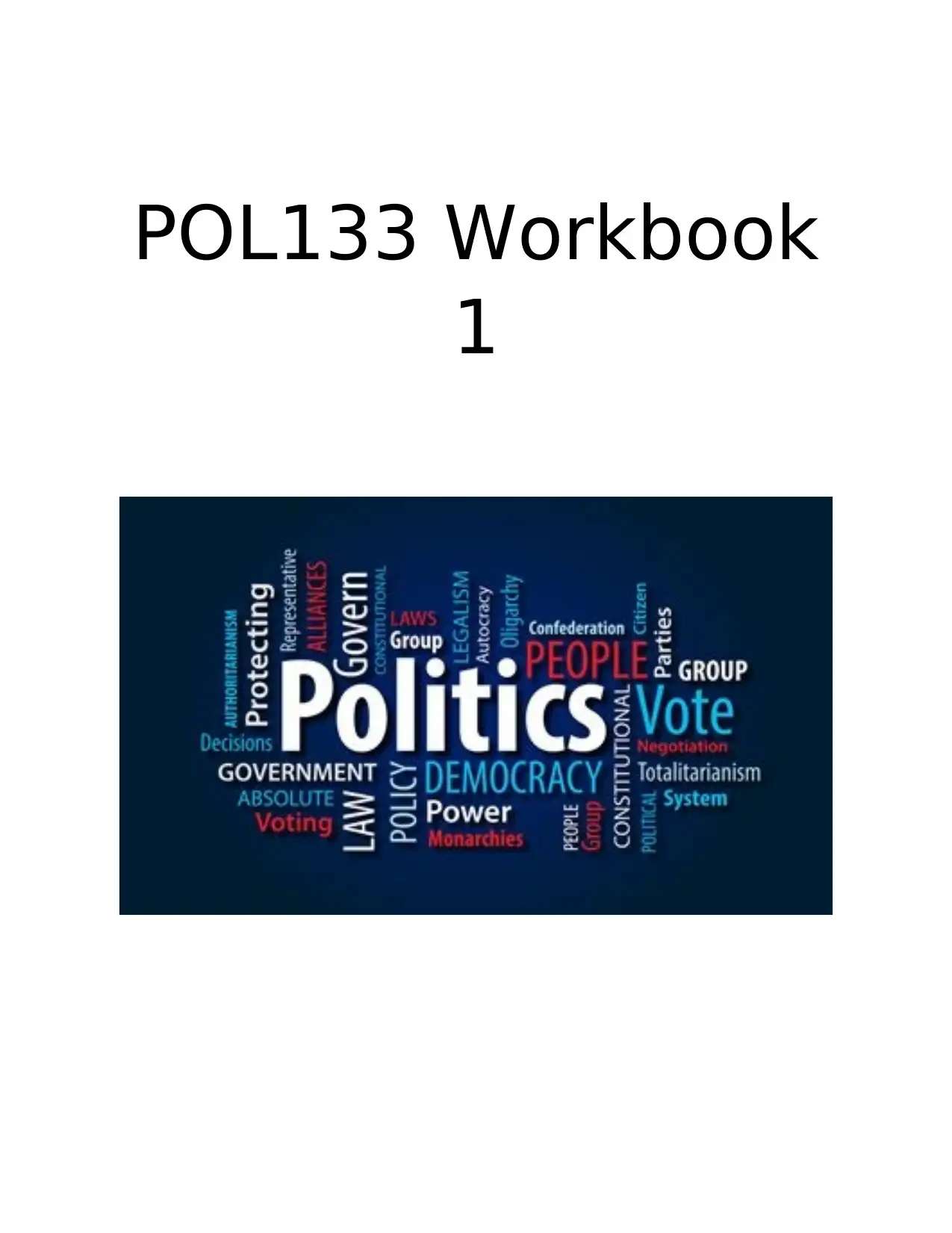
POL133 Workbook
1
1
Paraphrase This Document
Need a fresh take? Get an instant paraphrase of this document with our AI Paraphraser
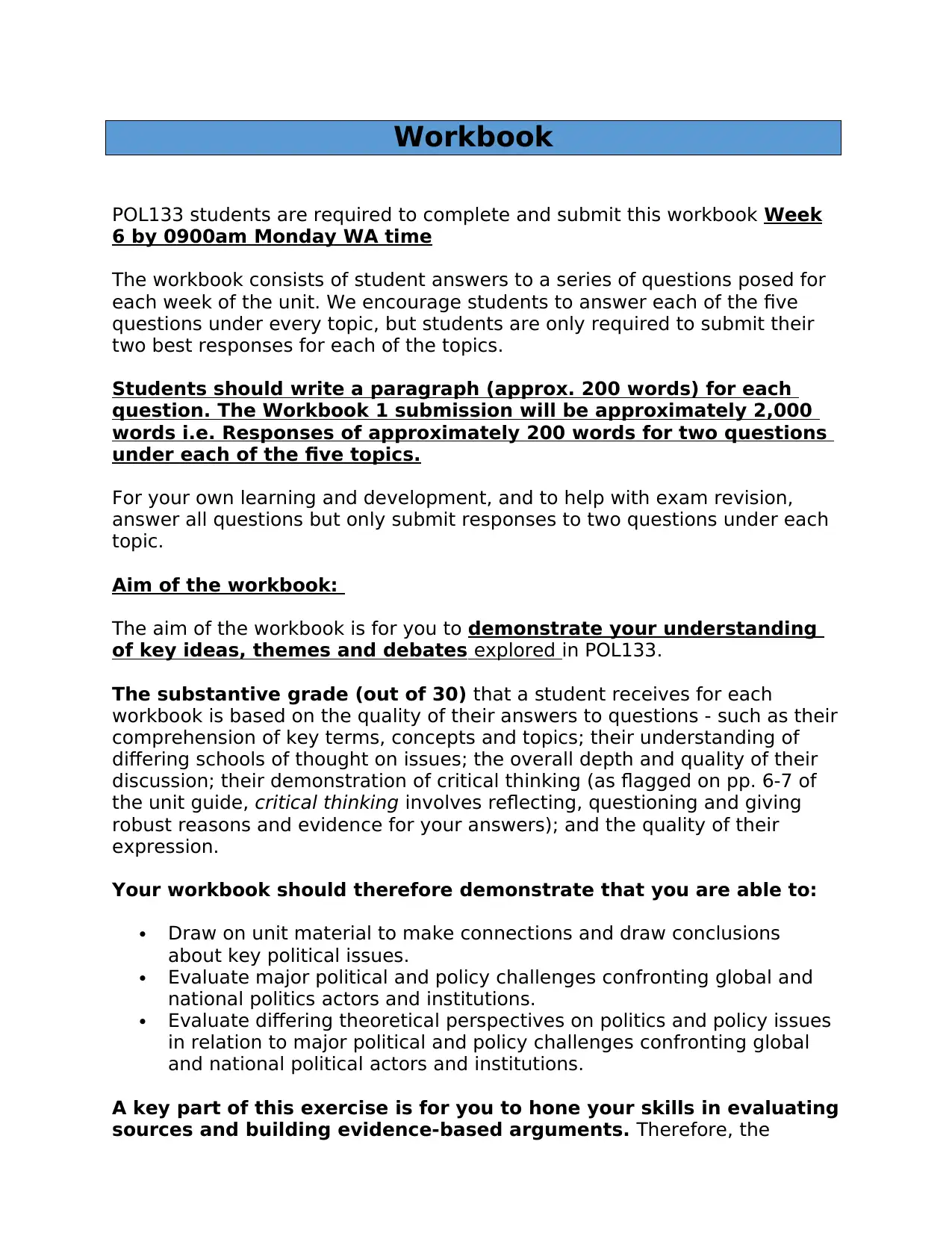
Workbook
POL133 students are required to complete and submit this workbook Week
6 by 0900am Monday WA time
The workbook consists of student answers to a series of questions posed for
each week of the unit. We encourage students to answer each of the five
questions under every topic, but students are only required to submit their
two best responses for each of the topics.
Students should write a paragraph (approx. 200 words) for each
question. The Workbook 1 submission will be approximately 2,000
words i.e. Responses of approximately 200 words for two questions
under each of the five topics.
For your own learning and development, and to help with exam revision,
answer all questions but only submit responses to two questions under each
topic.
Aim of the workbook:
The aim of the workbook is for you to demonstrate your understanding
of key ideas, themes and debates explored in POL133.
The substantive grade (out of 30) that a student receives for each
workbook is based on the quality of their answers to questions - such as their
comprehension of key terms, concepts and topics; their understanding of
differing schools of thought on issues; the overall depth and quality of their
discussion; their demonstration of critical thinking (as flagged on pp. 6-7 of
the unit guide, critical thinking involves reflecting, questioning and giving
robust reasons and evidence for your answers); and the quality of their
expression.
Your workbook should therefore demonstrate that you are able to:
Draw on unit material to make connections and draw conclusions
about key political issues.
Evaluate major political and policy challenges confronting global and
national politics actors and institutions.
Evaluate differing theoretical perspectives on politics and policy issues
in relation to major political and policy challenges confronting global
and national political actors and institutions.
A key part of this exercise is for you to hone your skills in evaluating
sources and building evidence-based arguments. Therefore, the
POL133 students are required to complete and submit this workbook Week
6 by 0900am Monday WA time
The workbook consists of student answers to a series of questions posed for
each week of the unit. We encourage students to answer each of the five
questions under every topic, but students are only required to submit their
two best responses for each of the topics.
Students should write a paragraph (approx. 200 words) for each
question. The Workbook 1 submission will be approximately 2,000
words i.e. Responses of approximately 200 words for two questions
under each of the five topics.
For your own learning and development, and to help with exam revision,
answer all questions but only submit responses to two questions under each
topic.
Aim of the workbook:
The aim of the workbook is for you to demonstrate your understanding
of key ideas, themes and debates explored in POL133.
The substantive grade (out of 30) that a student receives for each
workbook is based on the quality of their answers to questions - such as their
comprehension of key terms, concepts and topics; their understanding of
differing schools of thought on issues; the overall depth and quality of their
discussion; their demonstration of critical thinking (as flagged on pp. 6-7 of
the unit guide, critical thinking involves reflecting, questioning and giving
robust reasons and evidence for your answers); and the quality of their
expression.
Your workbook should therefore demonstrate that you are able to:
Draw on unit material to make connections and draw conclusions
about key political issues.
Evaluate major political and policy challenges confronting global and
national politics actors and institutions.
Evaluate differing theoretical perspectives on politics and policy issues
in relation to major political and policy challenges confronting global
and national political actors and institutions.
A key part of this exercise is for you to hone your skills in evaluating
sources and building evidence-based arguments. Therefore, the
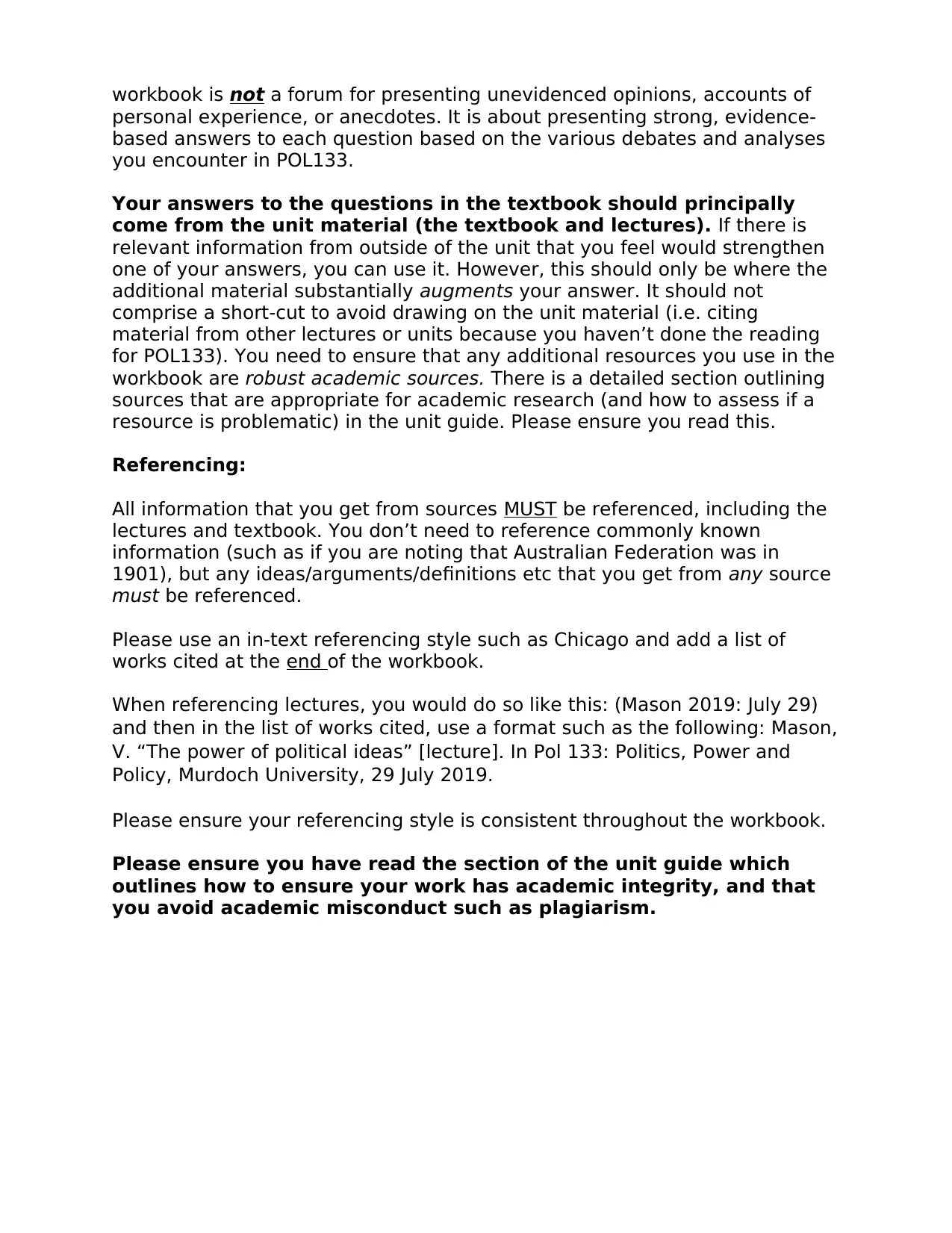
workbook is not a forum for presenting unevidenced opinions, accounts of
personal experience, or anecdotes. It is about presenting strong, evidence-
based answers to each question based on the various debates and analyses
you encounter in POL133.
Your answers to the questions in the textbook should principally
come from the unit material (the textbook and lectures). If there is
relevant information from outside of the unit that you feel would strengthen
one of your answers, you can use it. However, this should only be where the
additional material substantially augments your answer. It should not
comprise a short-cut to avoid drawing on the unit material (i.e. citing
material from other lectures or units because you haven’t done the reading
for POL133). You need to ensure that any additional resources you use in the
workbook are robust academic sources. There is a detailed section outlining
sources that are appropriate for academic research (and how to assess if a
resource is problematic) in the unit guide. Please ensure you read this.
Referencing:
All information that you get from sources MUST be referenced, including the
lectures and textbook. You don’t need to reference commonly known
information (such as if you are noting that Australian Federation was in
1901), but any ideas/arguments/definitions etc that you get from any source
must be referenced.
Please use an in-text referencing style such as Chicago and add a list of
works cited at the end of the workbook.
When referencing lectures, you would do so like this: (Mason 2019: July 29)
and then in the list of works cited, use a format such as the following: Mason,
V. “The power of political ideas” [lecture]. In Pol 133: Politics, Power and
Policy, Murdoch University, 29 July 2019.
Please ensure your referencing style is consistent throughout the workbook.
Please ensure you have read the section of the unit guide which
outlines how to ensure your work has academic integrity, and that
you avoid academic misconduct such as plagiarism.
personal experience, or anecdotes. It is about presenting strong, evidence-
based answers to each question based on the various debates and analyses
you encounter in POL133.
Your answers to the questions in the textbook should principally
come from the unit material (the textbook and lectures). If there is
relevant information from outside of the unit that you feel would strengthen
one of your answers, you can use it. However, this should only be where the
additional material substantially augments your answer. It should not
comprise a short-cut to avoid drawing on the unit material (i.e. citing
material from other lectures or units because you haven’t done the reading
for POL133). You need to ensure that any additional resources you use in the
workbook are robust academic sources. There is a detailed section outlining
sources that are appropriate for academic research (and how to assess if a
resource is problematic) in the unit guide. Please ensure you read this.
Referencing:
All information that you get from sources MUST be referenced, including the
lectures and textbook. You don’t need to reference commonly known
information (such as if you are noting that Australian Federation was in
1901), but any ideas/arguments/definitions etc that you get from any source
must be referenced.
Please use an in-text referencing style such as Chicago and add a list of
works cited at the end of the workbook.
When referencing lectures, you would do so like this: (Mason 2019: July 29)
and then in the list of works cited, use a format such as the following: Mason,
V. “The power of political ideas” [lecture]. In Pol 133: Politics, Power and
Policy, Murdoch University, 29 July 2019.
Please ensure your referencing style is consistent throughout the workbook.
Please ensure you have read the section of the unit guide which
outlines how to ensure your work has academic integrity, and that
you avoid academic misconduct such as plagiarism.
⊘ This is a preview!⊘
Do you want full access?
Subscribe today to unlock all pages.

Trusted by 1+ million students worldwide
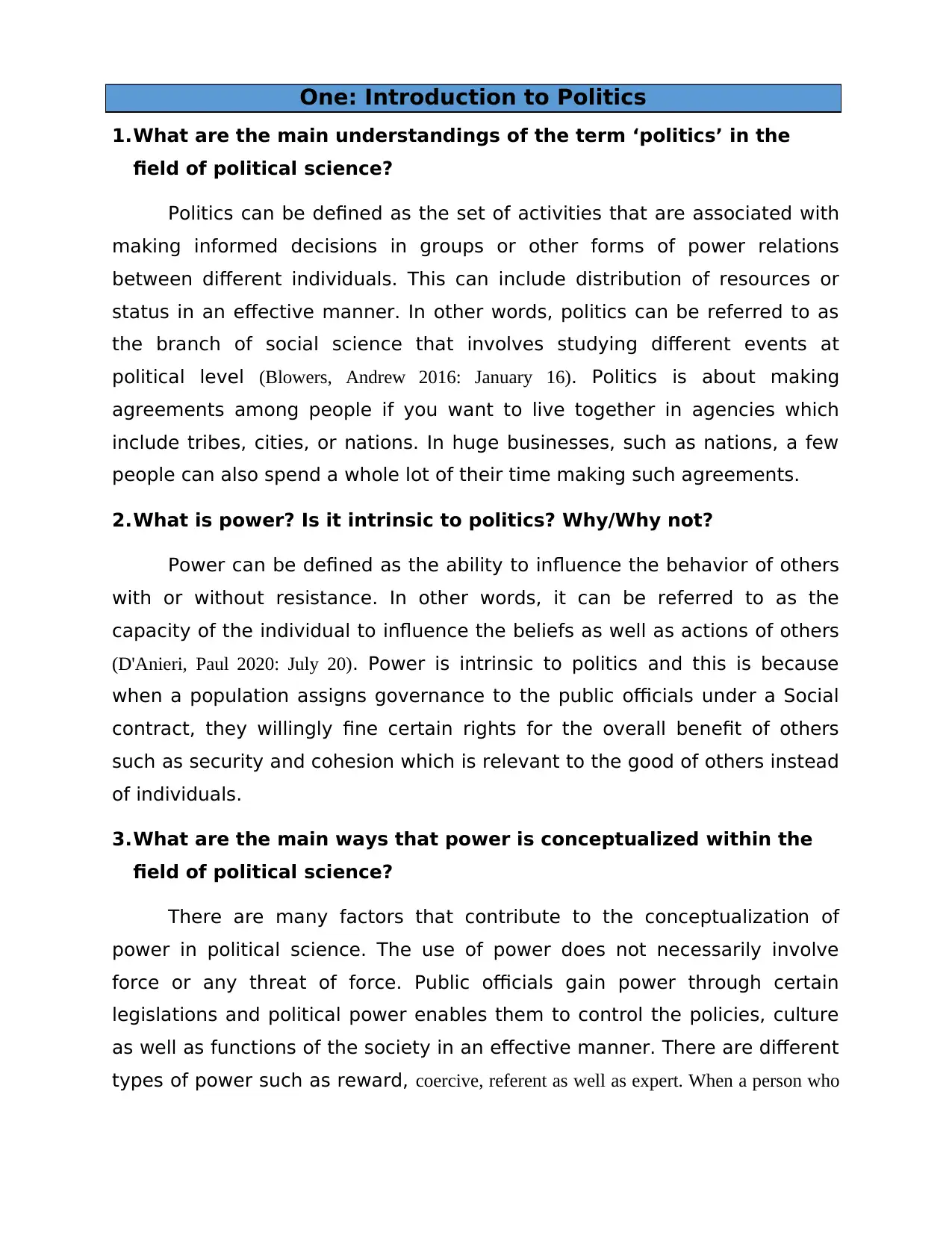
One: Introduction to Politics
1.What are the main understandings of the term ‘politics’ in the
field of political science?
Politics can be defined as the set of activities that are associated with
making informed decisions in groups or other forms of power relations
between different individuals. This can include distribution of resources or
status in an effective manner. In other words, politics can be referred to as
the branch of social science that involves studying different events at
political level (Blowers, Andrew 2016: January 16). Politics is about making
agreements among people if you want to live together in agencies which
include tribes, cities, or nations. In huge businesses, such as nations, a few
people can also spend a whole lot of their time making such agreements.
2.What is power? Is it intrinsic to politics? Why/Why not?
Power can be defined as the ability to influence the behavior of others
with or without resistance. In other words, it can be referred to as the
capacity of the individual to influence the beliefs as well as actions of others
(D'Anieri, Paul 2020: July 20). Power is intrinsic to politics and this is because
when a population assigns governance to the public officials under a Social
contract, they willingly fine certain rights for the overall benefit of others
such as security and cohesion which is relevant to the good of others instead
of individuals.
3.What are the main ways that power is conceptualized within the
field of political science?
There are many factors that contribute to the conceptualization of
power in political science. The use of power does not necessarily involve
force or any threat of force. Public officials gain power through certain
legislations and political power enables them to control the policies, culture
as well as functions of the society in an effective manner. There are different
types of power such as reward, coercive, referent as well as expert. When a person who
1.What are the main understandings of the term ‘politics’ in the
field of political science?
Politics can be defined as the set of activities that are associated with
making informed decisions in groups or other forms of power relations
between different individuals. This can include distribution of resources or
status in an effective manner. In other words, politics can be referred to as
the branch of social science that involves studying different events at
political level (Blowers, Andrew 2016: January 16). Politics is about making
agreements among people if you want to live together in agencies which
include tribes, cities, or nations. In huge businesses, such as nations, a few
people can also spend a whole lot of their time making such agreements.
2.What is power? Is it intrinsic to politics? Why/Why not?
Power can be defined as the ability to influence the behavior of others
with or without resistance. In other words, it can be referred to as the
capacity of the individual to influence the beliefs as well as actions of others
(D'Anieri, Paul 2020: July 20). Power is intrinsic to politics and this is because
when a population assigns governance to the public officials under a Social
contract, they willingly fine certain rights for the overall benefit of others
such as security and cohesion which is relevant to the good of others instead
of individuals.
3.What are the main ways that power is conceptualized within the
field of political science?
There are many factors that contribute to the conceptualization of
power in political science. The use of power does not necessarily involve
force or any threat of force. Public officials gain power through certain
legislations and political power enables them to control the policies, culture
as well as functions of the society in an effective manner. There are different
types of power such as reward, coercive, referent as well as expert. When a person who
Paraphrase This Document
Need a fresh take? Get an instant paraphrase of this document with our AI Paraphraser
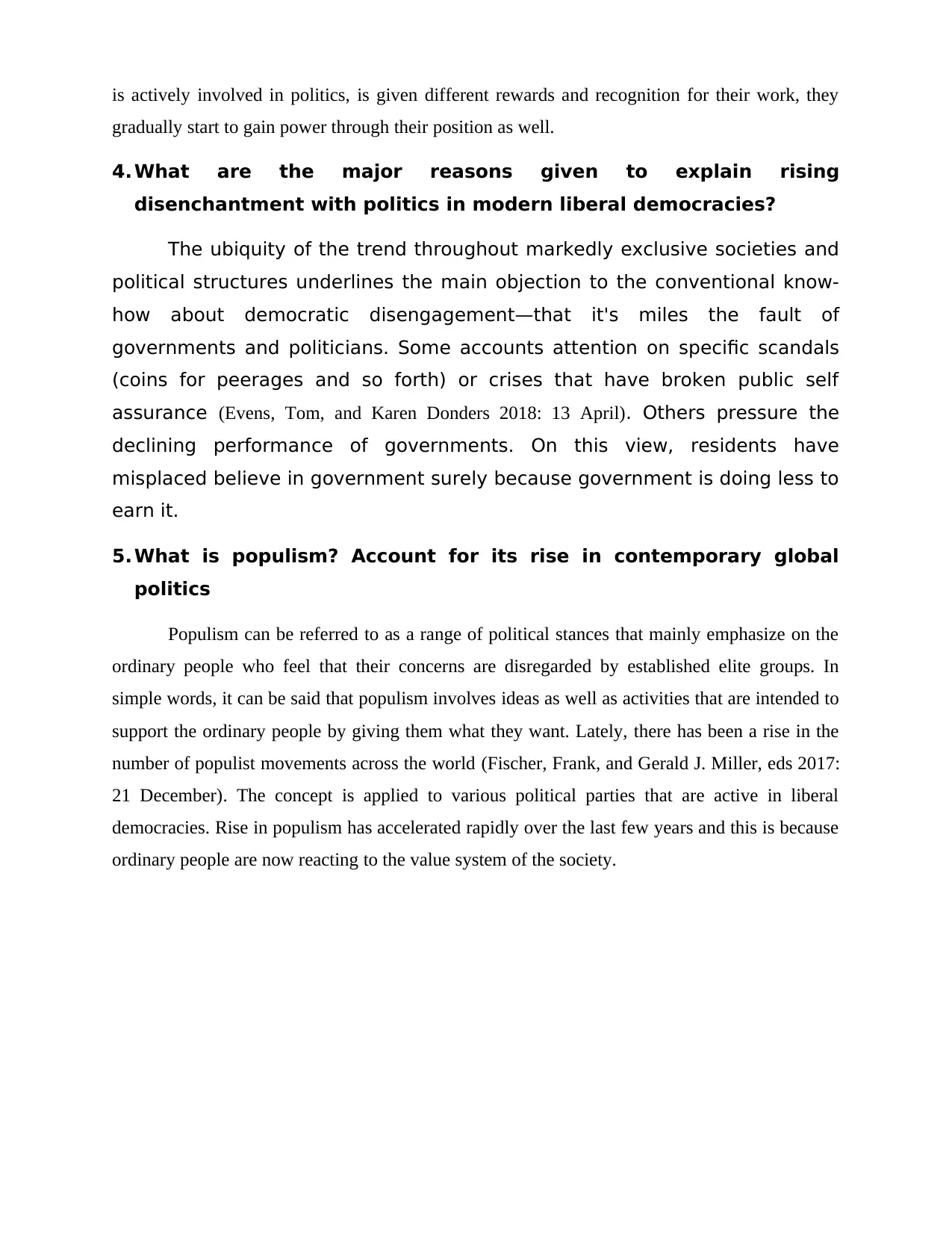
is actively involved in politics, is given different rewards and recognition for their work, they
gradually start to gain power through their position as well.
4. What are the major reasons given to explain rising
disenchantment with politics in modern liberal democracies?
The ubiquity of the trend throughout markedly exclusive societies and
political structures underlines the main objection to the conventional know-
how about democratic disengagement—that it's miles the fault of
governments and politicians. Some accounts attention on specific scandals
(coins for peerages and so forth) or crises that have broken public self
assurance (Evens, Tom, and Karen Donders 2018: 13 April). Others pressure the
declining performance of governments. On this view, residents have
misplaced believe in government surely because government is doing less to
earn it.
5. What is populism? Account for its rise in contemporary global
politics
Populism can be referred to as a range of political stances that mainly emphasize on the
ordinary people who feel that their concerns are disregarded by established elite groups. In
simple words, it can be said that populism involves ideas as well as activities that are intended to
support the ordinary people by giving them what they want. Lately, there has been a rise in the
number of populist movements across the world (Fischer, Frank, and Gerald J. Miller, eds 2017:
21 December). The concept is applied to various political parties that are active in liberal
democracies. Rise in populism has accelerated rapidly over the last few years and this is because
ordinary people are now reacting to the value system of the society.
gradually start to gain power through their position as well.
4. What are the major reasons given to explain rising
disenchantment with politics in modern liberal democracies?
The ubiquity of the trend throughout markedly exclusive societies and
political structures underlines the main objection to the conventional know-
how about democratic disengagement—that it's miles the fault of
governments and politicians. Some accounts attention on specific scandals
(coins for peerages and so forth) or crises that have broken public self
assurance (Evens, Tom, and Karen Donders 2018: 13 April). Others pressure the
declining performance of governments. On this view, residents have
misplaced believe in government surely because government is doing less to
earn it.
5. What is populism? Account for its rise in contemporary global
politics
Populism can be referred to as a range of political stances that mainly emphasize on the
ordinary people who feel that their concerns are disregarded by established elite groups. In
simple words, it can be said that populism involves ideas as well as activities that are intended to
support the ordinary people by giving them what they want. Lately, there has been a rise in the
number of populist movements across the world (Fischer, Frank, and Gerald J. Miller, eds 2017:
21 December). The concept is applied to various political parties that are active in liberal
democracies. Rise in populism has accelerated rapidly over the last few years and this is because
ordinary people are now reacting to the value system of the society.
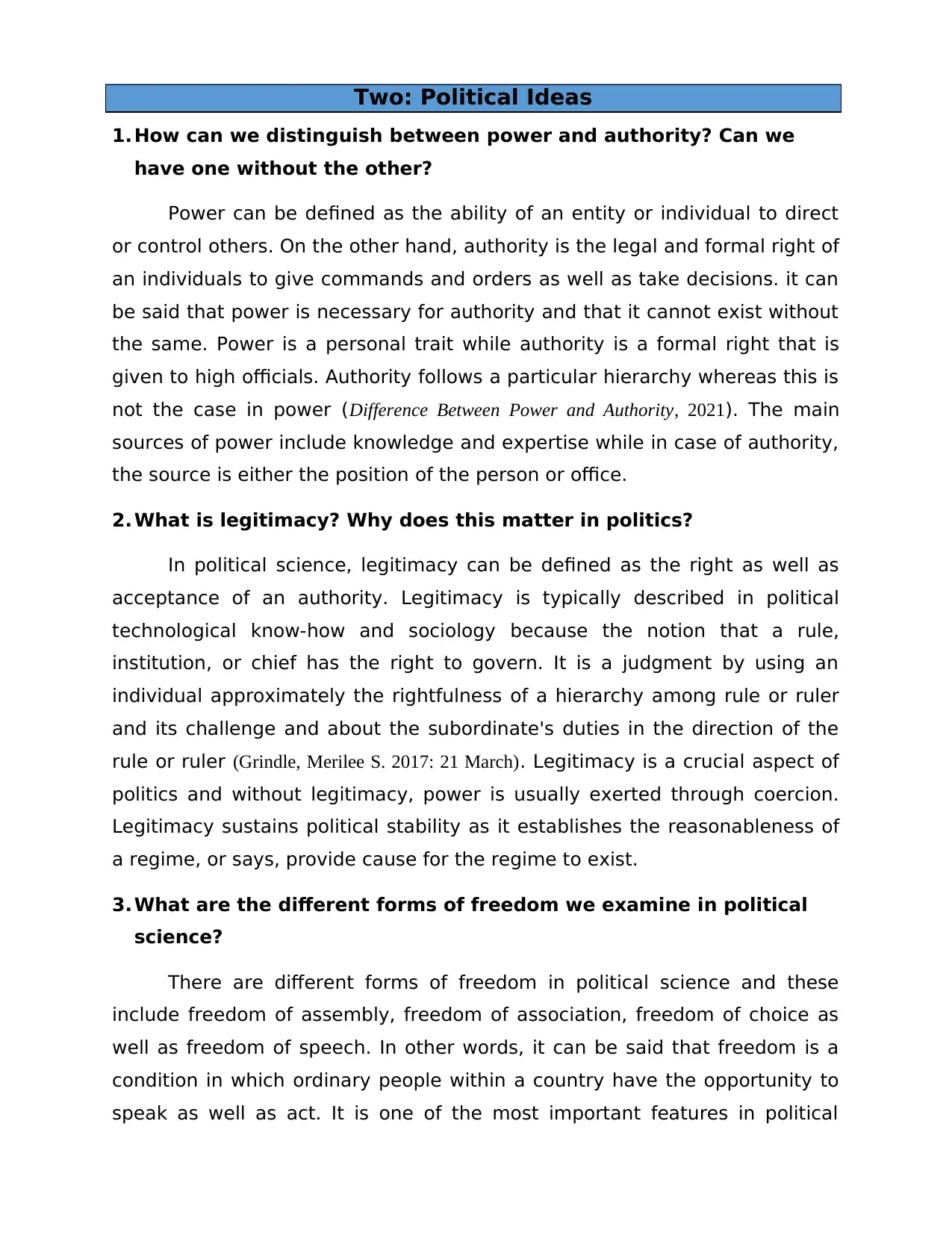
Two: Political Ideas
1. How can we distinguish between power and authority? Can we
have one without the other?
Power can be defined as the ability of an entity or individual to direct
or control others. On the other hand, authority is the legal and formal right of
an individuals to give commands and orders as well as take decisions. it can
be said that power is necessary for authority and that it cannot exist without
the same. Power is a personal trait while authority is a formal right that is
given to high officials. Authority follows a particular hierarchy whereas this is
not the case in power (Difference Between Power and Authority, 2021). The main
sources of power include knowledge and expertise while in case of authority,
the source is either the position of the person or office.
2. What is legitimacy? Why does this matter in politics?
In political science, legitimacy can be defined as the right as well as
acceptance of an authority. Legitimacy is typically described in political
technological know-how and sociology because the notion that a rule,
institution, or chief has the right to govern. It is a judgment by using an
individual approximately the rightfulness of a hierarchy among rule or ruler
and its challenge and about the subordinate's duties in the direction of the
rule or ruler (Grindle, Merilee S. 2017: 21 March). Legitimacy is a crucial aspect of
politics and without legitimacy, power is usually exerted through coercion.
Legitimacy sustains political stability as it establishes the reasonableness of
a regime, or says, provide cause for the regime to exist.
3. What are the different forms of freedom we examine in political
science?
There are different forms of freedom in political science and these
include freedom of assembly, freedom of association, freedom of choice as
well as freedom of speech. In other words, it can be said that freedom is a
condition in which ordinary people within a country have the opportunity to
speak as well as act. It is one of the most important features in political
1. How can we distinguish between power and authority? Can we
have one without the other?
Power can be defined as the ability of an entity or individual to direct
or control others. On the other hand, authority is the legal and formal right of
an individuals to give commands and orders as well as take decisions. it can
be said that power is necessary for authority and that it cannot exist without
the same. Power is a personal trait while authority is a formal right that is
given to high officials. Authority follows a particular hierarchy whereas this is
not the case in power (Difference Between Power and Authority, 2021). The main
sources of power include knowledge and expertise while in case of authority,
the source is either the position of the person or office.
2. What is legitimacy? Why does this matter in politics?
In political science, legitimacy can be defined as the right as well as
acceptance of an authority. Legitimacy is typically described in political
technological know-how and sociology because the notion that a rule,
institution, or chief has the right to govern. It is a judgment by using an
individual approximately the rightfulness of a hierarchy among rule or ruler
and its challenge and about the subordinate's duties in the direction of the
rule or ruler (Grindle, Merilee S. 2017: 21 March). Legitimacy is a crucial aspect of
politics and without legitimacy, power is usually exerted through coercion.
Legitimacy sustains political stability as it establishes the reasonableness of
a regime, or says, provide cause for the regime to exist.
3. What are the different forms of freedom we examine in political
science?
There are different forms of freedom in political science and these
include freedom of assembly, freedom of association, freedom of choice as
well as freedom of speech. In other words, it can be said that freedom is a
condition in which ordinary people within a country have the opportunity to
speak as well as act. It is one of the most important features in political
⊘ This is a preview!⊘
Do you want full access?
Subscribe today to unlock all pages.

Trusted by 1+ million students worldwide
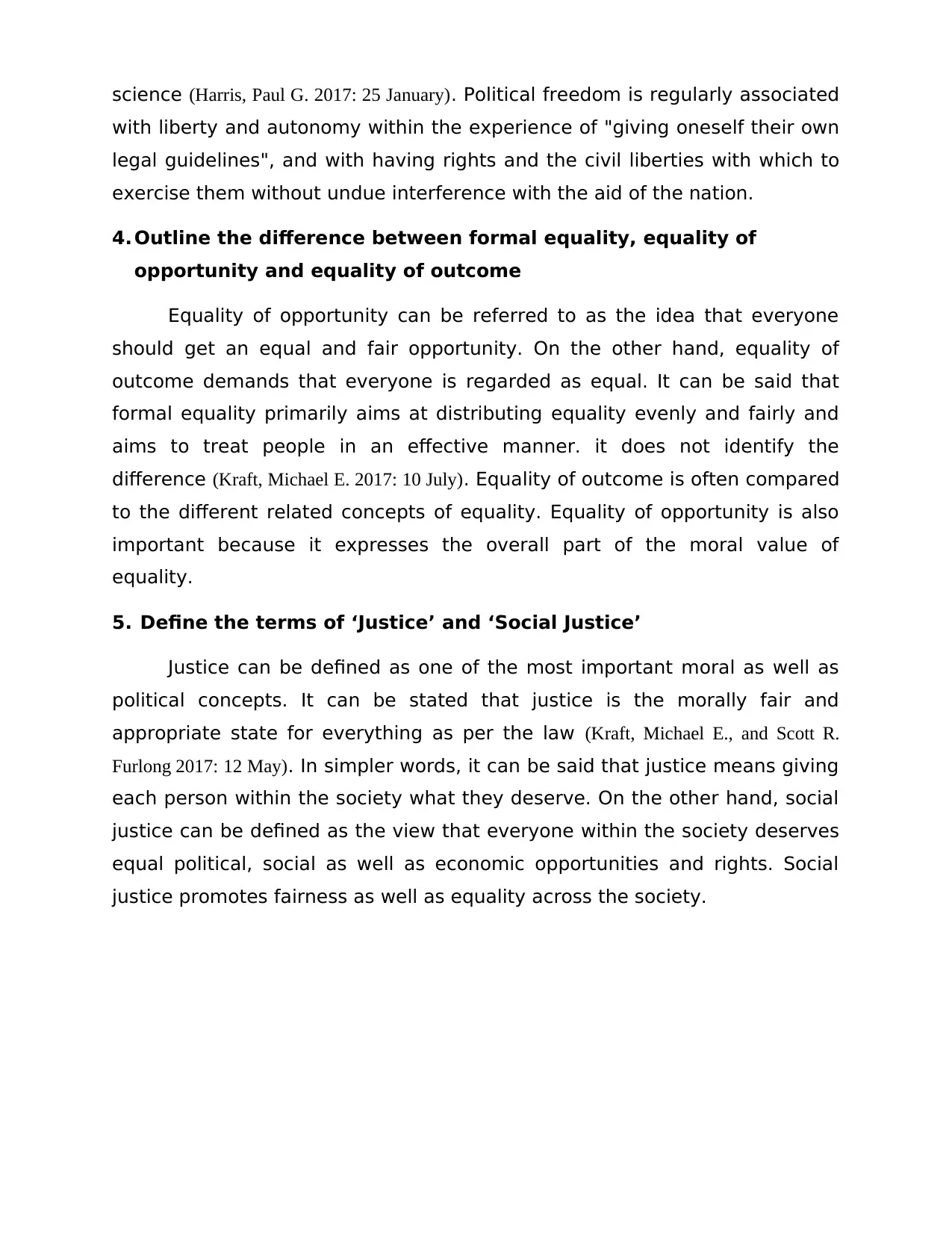
science (Harris, Paul G. 2017: 25 January). Political freedom is regularly associated
with liberty and autonomy within the experience of "giving oneself their own
legal guidelines", and with having rights and the civil liberties with which to
exercise them without undue interference with the aid of the nation.
4. Outline the difference between formal equality, equality of
opportunity and equality of outcome
Equality of opportunity can be referred to as the idea that everyone
should get an equal and fair opportunity. On the other hand, equality of
outcome demands that everyone is regarded as equal. It can be said that
formal equality primarily aims at distributing equality evenly and fairly and
aims to treat people in an effective manner. it does not identify the
difference (Kraft, Michael E. 2017: 10 July). Equality of outcome is often compared
to the different related concepts of equality. Equality of opportunity is also
important because it expresses the overall part of the moral value of
equality.
5. Define the terms of ‘Justice’ and ‘Social Justice’
Justice can be defined as one of the most important moral as well as
political concepts. It can be stated that justice is the morally fair and
appropriate state for everything as per the law (Kraft, Michael E., and Scott R.
Furlong 2017: 12 May). In simpler words, it can be said that justice means giving
each person within the society what they deserve. On the other hand, social
justice can be defined as the view that everyone within the society deserves
equal political, social as well as economic opportunities and rights. Social
justice promotes fairness as well as equality across the society.
with liberty and autonomy within the experience of "giving oneself their own
legal guidelines", and with having rights and the civil liberties with which to
exercise them without undue interference with the aid of the nation.
4. Outline the difference between formal equality, equality of
opportunity and equality of outcome
Equality of opportunity can be referred to as the idea that everyone
should get an equal and fair opportunity. On the other hand, equality of
outcome demands that everyone is regarded as equal. It can be said that
formal equality primarily aims at distributing equality evenly and fairly and
aims to treat people in an effective manner. it does not identify the
difference (Kraft, Michael E. 2017: 10 July). Equality of outcome is often compared
to the different related concepts of equality. Equality of opportunity is also
important because it expresses the overall part of the moral value of
equality.
5. Define the terms of ‘Justice’ and ‘Social Justice’
Justice can be defined as one of the most important moral as well as
political concepts. It can be stated that justice is the morally fair and
appropriate state for everything as per the law (Kraft, Michael E., and Scott R.
Furlong 2017: 12 May). In simpler words, it can be said that justice means giving
each person within the society what they deserve. On the other hand, social
justice can be defined as the view that everyone within the society deserves
equal political, social as well as economic opportunities and rights. Social
justice promotes fairness as well as equality across the society.
Paraphrase This Document
Need a fresh take? Get an instant paraphrase of this document with our AI Paraphraser
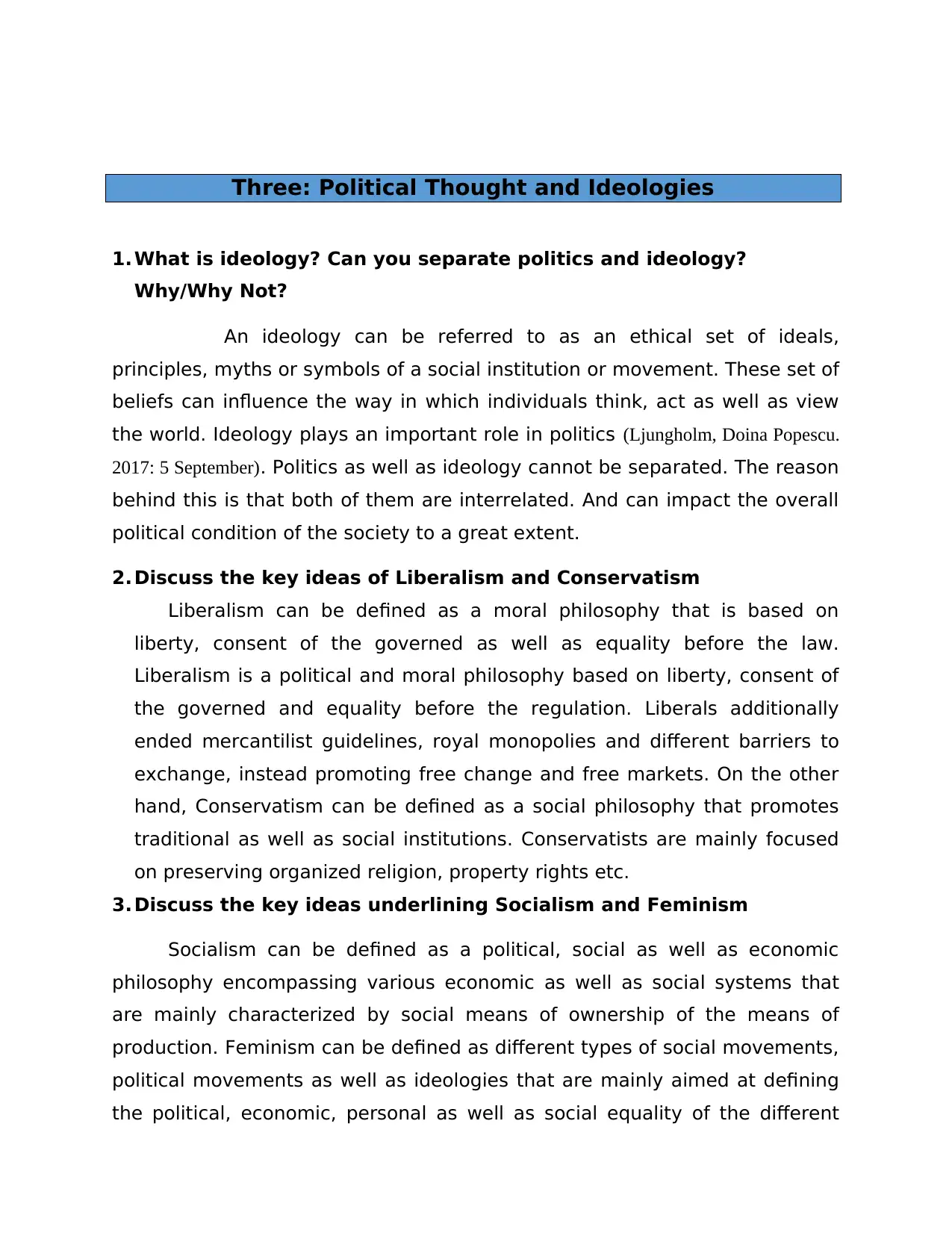
Three: Political Thought and Ideologies
1. What is ideology? Can you separate politics and ideology?
Why/Why Not?
An ideology can be referred to as an ethical set of ideals,
principles, myths or symbols of a social institution or movement. These set of
beliefs can influence the way in which individuals think, act as well as view
the world. Ideology plays an important role in politics (Ljungholm, Doina Popescu.
2017: 5 September). Politics as well as ideology cannot be separated. The reason
behind this is that both of them are interrelated. And can impact the overall
political condition of the society to a great extent.
2. Discuss the key ideas of Liberalism and Conservatism
Liberalism can be defined as a moral philosophy that is based on
liberty, consent of the governed as well as equality before the law.
Liberalism is a political and moral philosophy based on liberty, consent of
the governed and equality before the regulation. Liberals additionally
ended mercantilist guidelines, royal monopolies and different barriers to
exchange, instead promoting free change and free markets. On the other
hand, Conservatism can be defined as a social philosophy that promotes
traditional as well as social institutions. Conservatists are mainly focused
on preserving organized religion, property rights etc.
3. Discuss the key ideas underlining Socialism and Feminism
Socialism can be defined as a political, social as well as economic
philosophy encompassing various economic as well as social systems that
are mainly characterized by social means of ownership of the means of
production. Feminism can be defined as different types of social movements,
political movements as well as ideologies that are mainly aimed at defining
the political, economic, personal as well as social equality of the different
1. What is ideology? Can you separate politics and ideology?
Why/Why Not?
An ideology can be referred to as an ethical set of ideals,
principles, myths or symbols of a social institution or movement. These set of
beliefs can influence the way in which individuals think, act as well as view
the world. Ideology plays an important role in politics (Ljungholm, Doina Popescu.
2017: 5 September). Politics as well as ideology cannot be separated. The reason
behind this is that both of them are interrelated. And can impact the overall
political condition of the society to a great extent.
2. Discuss the key ideas of Liberalism and Conservatism
Liberalism can be defined as a moral philosophy that is based on
liberty, consent of the governed as well as equality before the law.
Liberalism is a political and moral philosophy based on liberty, consent of
the governed and equality before the regulation. Liberals additionally
ended mercantilist guidelines, royal monopolies and different barriers to
exchange, instead promoting free change and free markets. On the other
hand, Conservatism can be defined as a social philosophy that promotes
traditional as well as social institutions. Conservatists are mainly focused
on preserving organized religion, property rights etc.
3. Discuss the key ideas underlining Socialism and Feminism
Socialism can be defined as a political, social as well as economic
philosophy encompassing various economic as well as social systems that
are mainly characterized by social means of ownership of the means of
production. Feminism can be defined as different types of social movements,
political movements as well as ideologies that are mainly aimed at defining
the political, economic, personal as well as social equality of the different
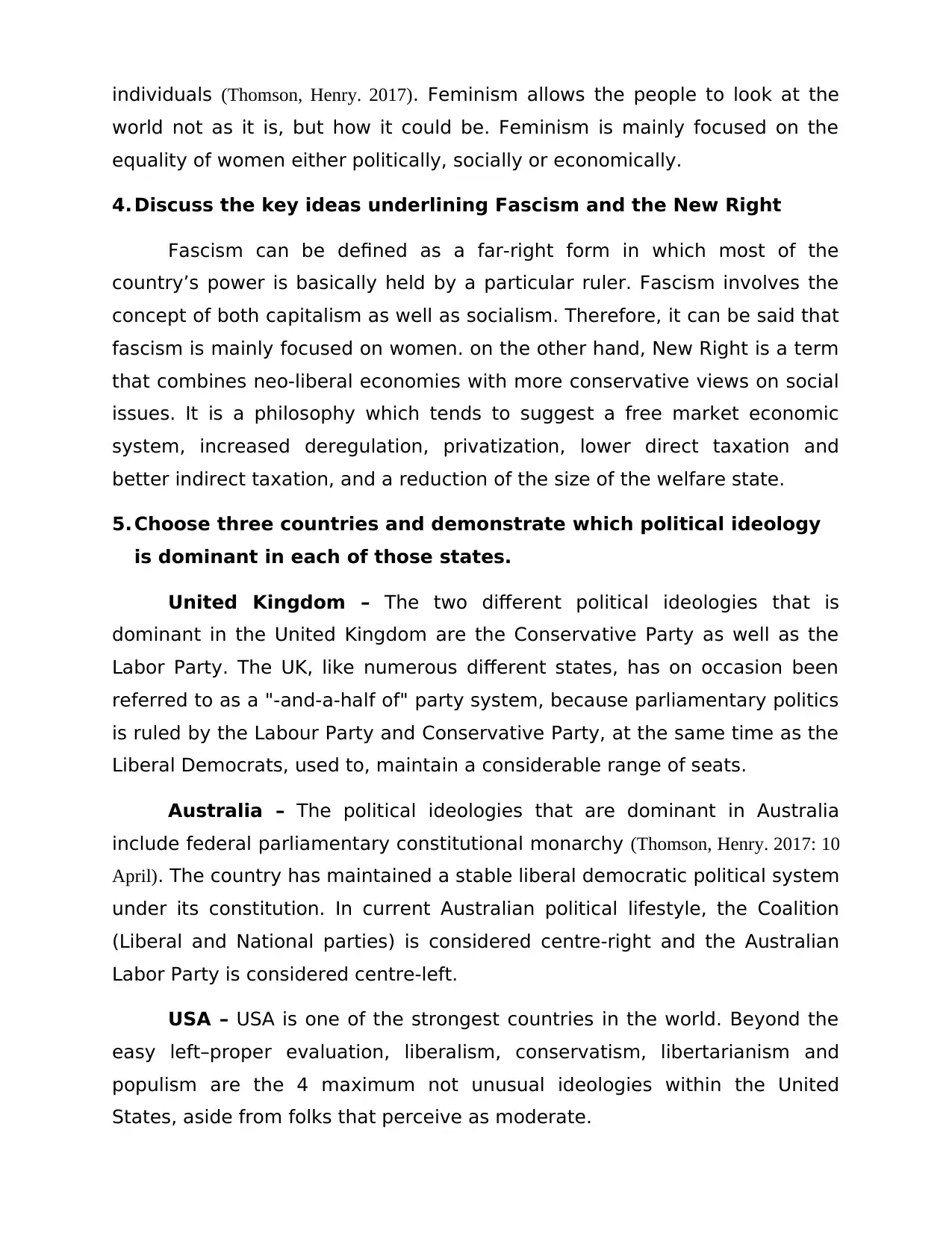
individuals (Thomson, Henry. 2017). Feminism allows the people to look at the
world not as it is, but how it could be. Feminism is mainly focused on the
equality of women either politically, socially or economically.
4. Discuss the key ideas underlining Fascism and the New Right
Fascism can be defined as a far-right form in which most of the
country’s power is basically held by a particular ruler. Fascism involves the
concept of both capitalism as well as socialism. Therefore, it can be said that
fascism is mainly focused on women. on the other hand, New Right is a term
that combines neo-liberal economies with more conservative views on social
issues. It is a philosophy which tends to suggest a free market economic
system, increased deregulation, privatization, lower direct taxation and
better indirect taxation, and a reduction of the size of the welfare state.
5. Choose three countries and demonstrate which political ideology
is dominant in each of those states.
United Kingdom – The two different political ideologies that is
dominant in the United Kingdom are the Conservative Party as well as the
Labor Party. The UK, like numerous different states, has on occasion been
referred to as a "-and-a-half of" party system, because parliamentary politics
is ruled by the Labour Party and Conservative Party, at the same time as the
Liberal Democrats, used to, maintain a considerable range of seats.
Australia – The political ideologies that are dominant in Australia
include federal parliamentary constitutional monarchy (Thomson, Henry. 2017: 10
April). The country has maintained a stable liberal democratic political system
under its constitution. In current Australian political lifestyle, the Coalition
(Liberal and National parties) is considered centre-right and the Australian
Labor Party is considered centre-left.
USA – USA is one of the strongest countries in the world. Beyond the
easy left–proper evaluation, liberalism, conservatism, libertarianism and
populism are the 4 maximum not unusual ideologies within the United
States, aside from folks that perceive as moderate.
world not as it is, but how it could be. Feminism is mainly focused on the
equality of women either politically, socially or economically.
4. Discuss the key ideas underlining Fascism and the New Right
Fascism can be defined as a far-right form in which most of the
country’s power is basically held by a particular ruler. Fascism involves the
concept of both capitalism as well as socialism. Therefore, it can be said that
fascism is mainly focused on women. on the other hand, New Right is a term
that combines neo-liberal economies with more conservative views on social
issues. It is a philosophy which tends to suggest a free market economic
system, increased deregulation, privatization, lower direct taxation and
better indirect taxation, and a reduction of the size of the welfare state.
5. Choose three countries and demonstrate which political ideology
is dominant in each of those states.
United Kingdom – The two different political ideologies that is
dominant in the United Kingdom are the Conservative Party as well as the
Labor Party. The UK, like numerous different states, has on occasion been
referred to as a "-and-a-half of" party system, because parliamentary politics
is ruled by the Labour Party and Conservative Party, at the same time as the
Liberal Democrats, used to, maintain a considerable range of seats.
Australia – The political ideologies that are dominant in Australia
include federal parliamentary constitutional monarchy (Thomson, Henry. 2017: 10
April). The country has maintained a stable liberal democratic political system
under its constitution. In current Australian political lifestyle, the Coalition
(Liberal and National parties) is considered centre-right and the Australian
Labor Party is considered centre-left.
USA – USA is one of the strongest countries in the world. Beyond the
easy left–proper evaluation, liberalism, conservatism, libertarianism and
populism are the 4 maximum not unusual ideologies within the United
States, aside from folks that perceive as moderate.
⊘ This is a preview!⊘
Do you want full access?
Subscribe today to unlock all pages.

Trusted by 1+ million students worldwide
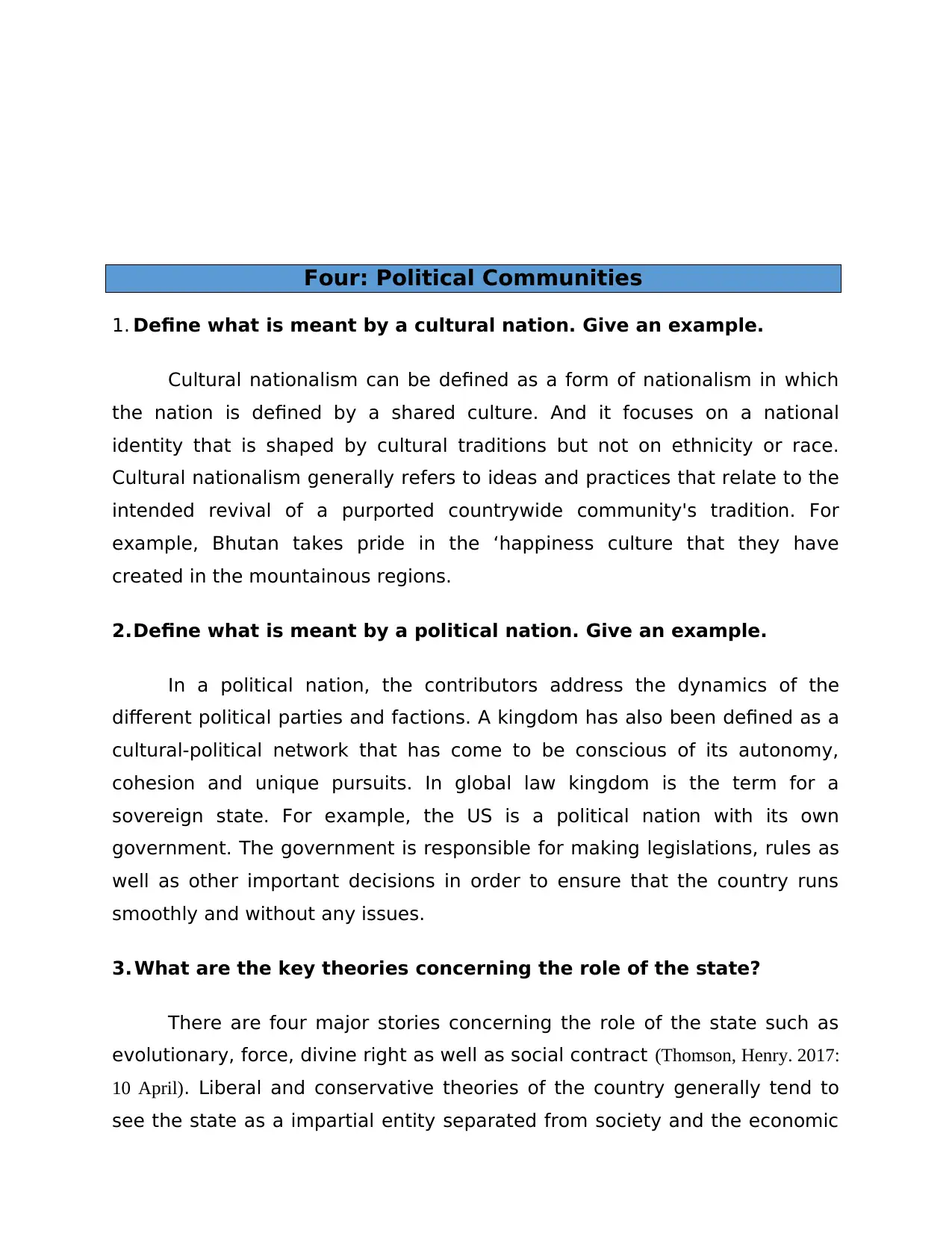
Four: Political Communities
1. Define what is meant by a cultural nation. Give an example.
Cultural nationalism can be defined as a form of nationalism in which
the nation is defined by a shared culture. And it focuses on a national
identity that is shaped by cultural traditions but not on ethnicity or race.
Cultural nationalism generally refers to ideas and practices that relate to the
intended revival of a purported countrywide community's tradition. For
example, Bhutan takes pride in the ‘happiness culture that they have
created in the mountainous regions.
2.Define what is meant by a political nation. Give an example.
In a political nation, the contributors address the dynamics of the
different political parties and factions. A kingdom has also been defined as a
cultural-political network that has come to be conscious of its autonomy,
cohesion and unique pursuits. In global law kingdom is the term for a
sovereign state. For example, the US is a political nation with its own
government. The government is responsible for making legislations, rules as
well as other important decisions in order to ensure that the country runs
smoothly and without any issues.
3. What are the key theories concerning the role of the state?
There are four major stories concerning the role of the state such as
evolutionary, force, divine right as well as social contract (Thomson, Henry. 2017:
10 April). Liberal and conservative theories of the country generally tend to
see the state as a impartial entity separated from society and the economic
1. Define what is meant by a cultural nation. Give an example.
Cultural nationalism can be defined as a form of nationalism in which
the nation is defined by a shared culture. And it focuses on a national
identity that is shaped by cultural traditions but not on ethnicity or race.
Cultural nationalism generally refers to ideas and practices that relate to the
intended revival of a purported countrywide community's tradition. For
example, Bhutan takes pride in the ‘happiness culture that they have
created in the mountainous regions.
2.Define what is meant by a political nation. Give an example.
In a political nation, the contributors address the dynamics of the
different political parties and factions. A kingdom has also been defined as a
cultural-political network that has come to be conscious of its autonomy,
cohesion and unique pursuits. In global law kingdom is the term for a
sovereign state. For example, the US is a political nation with its own
government. The government is responsible for making legislations, rules as
well as other important decisions in order to ensure that the country runs
smoothly and without any issues.
3. What are the key theories concerning the role of the state?
There are four major stories concerning the role of the state such as
evolutionary, force, divine right as well as social contract (Thomson, Henry. 2017:
10 April). Liberal and conservative theories of the country generally tend to
see the state as a impartial entity separated from society and the economic
Paraphrase This Document
Need a fresh take? Get an instant paraphrase of this document with our AI Paraphraser
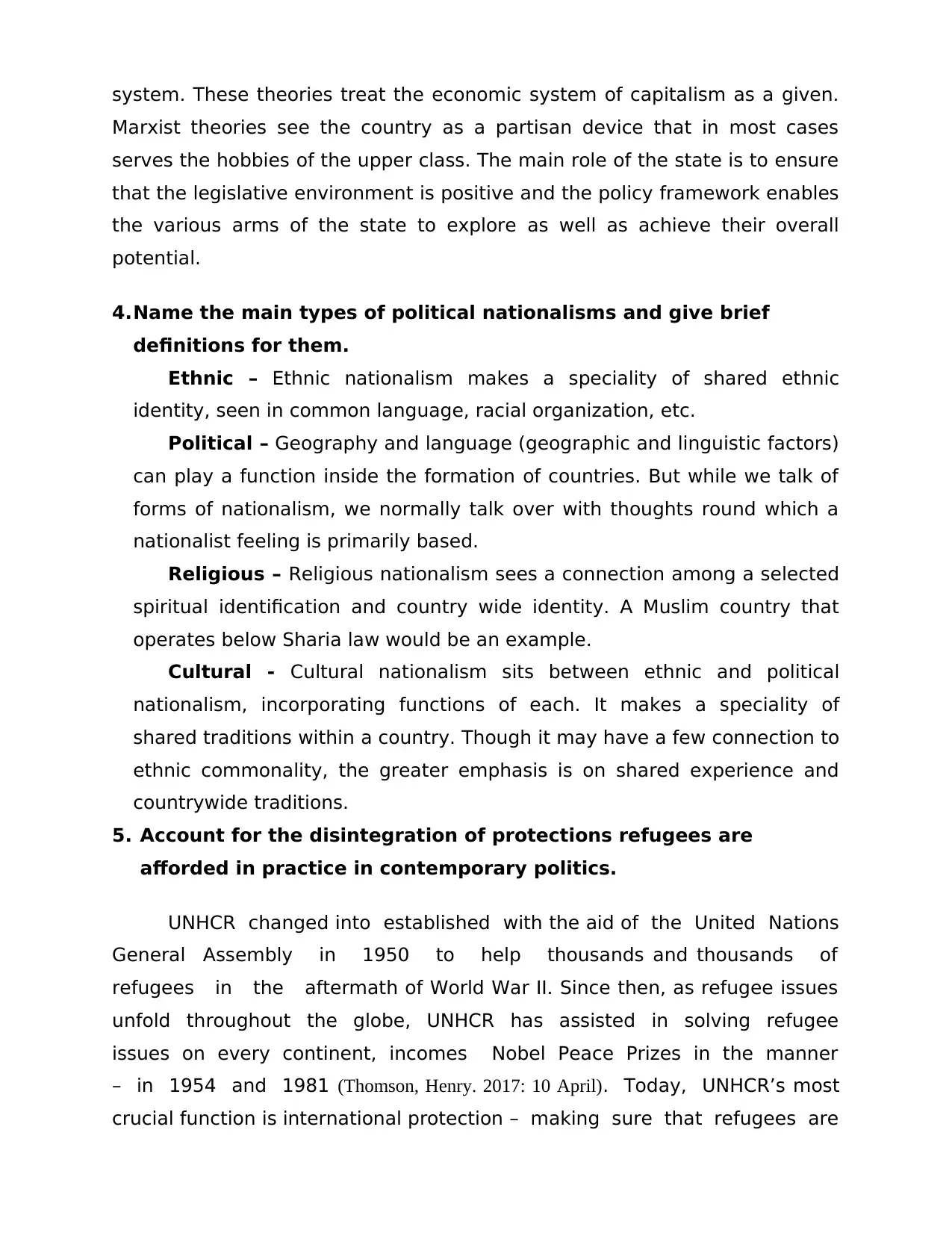
system. These theories treat the economic system of capitalism as a given.
Marxist theories see the country as a partisan device that in most cases
serves the hobbies of the upper class. The main role of the state is to ensure
that the legislative environment is positive and the policy framework enables
the various arms of the state to explore as well as achieve their overall
potential.
4.Name the main types of political nationalisms and give brief
definitions for them.
Ethnic – Ethnic nationalism makes a speciality of shared ethnic
identity, seen in common language, racial organization, etc.
Political – Geography and language (geographic and linguistic factors)
can play a function inside the formation of countries. But while we talk of
forms of nationalism, we normally talk over with thoughts round which a
nationalist feeling is primarily based.
Religious – Religious nationalism sees a connection among a selected
spiritual identification and country wide identity. A Muslim country that
operates below Sharia law would be an example.
Cultural - Cultural nationalism sits between ethnic and political
nationalism, incorporating functions of each. It makes a speciality of
shared traditions within a country. Though it may have a few connection to
ethnic commonality, the greater emphasis is on shared experience and
countrywide traditions.
5. Account for the disintegration of protections refugees are
afforded in practice in contemporary politics.
UNHCR changed into established with the aid of the United Nations
General Assembly in 1950 to help thousands and thousands of
refugees in the aftermath of World War II. Since then, as refugee issues
unfold throughout the globe, UNHCR has assisted in solving refugee
issues on every continent, incomes Nobel Peace Prizes in the manner
– in 1954 and 1981 (Thomson, Henry. 2017: 10 April). Today, UNHCR’s most
crucial function is international protection – making sure that refugees are
Marxist theories see the country as a partisan device that in most cases
serves the hobbies of the upper class. The main role of the state is to ensure
that the legislative environment is positive and the policy framework enables
the various arms of the state to explore as well as achieve their overall
potential.
4.Name the main types of political nationalisms and give brief
definitions for them.
Ethnic – Ethnic nationalism makes a speciality of shared ethnic
identity, seen in common language, racial organization, etc.
Political – Geography and language (geographic and linguistic factors)
can play a function inside the formation of countries. But while we talk of
forms of nationalism, we normally talk over with thoughts round which a
nationalist feeling is primarily based.
Religious – Religious nationalism sees a connection among a selected
spiritual identification and country wide identity. A Muslim country that
operates below Sharia law would be an example.
Cultural - Cultural nationalism sits between ethnic and political
nationalism, incorporating functions of each. It makes a speciality of
shared traditions within a country. Though it may have a few connection to
ethnic commonality, the greater emphasis is on shared experience and
countrywide traditions.
5. Account for the disintegration of protections refugees are
afforded in practice in contemporary politics.
UNHCR changed into established with the aid of the United Nations
General Assembly in 1950 to help thousands and thousands of
refugees in the aftermath of World War II. Since then, as refugee issues
unfold throughout the globe, UNHCR has assisted in solving refugee
issues on every continent, incomes Nobel Peace Prizes in the manner
– in 1954 and 1981 (Thomson, Henry. 2017: 10 April). Today, UNHCR’s most
crucial function is international protection – making sure that refugees are
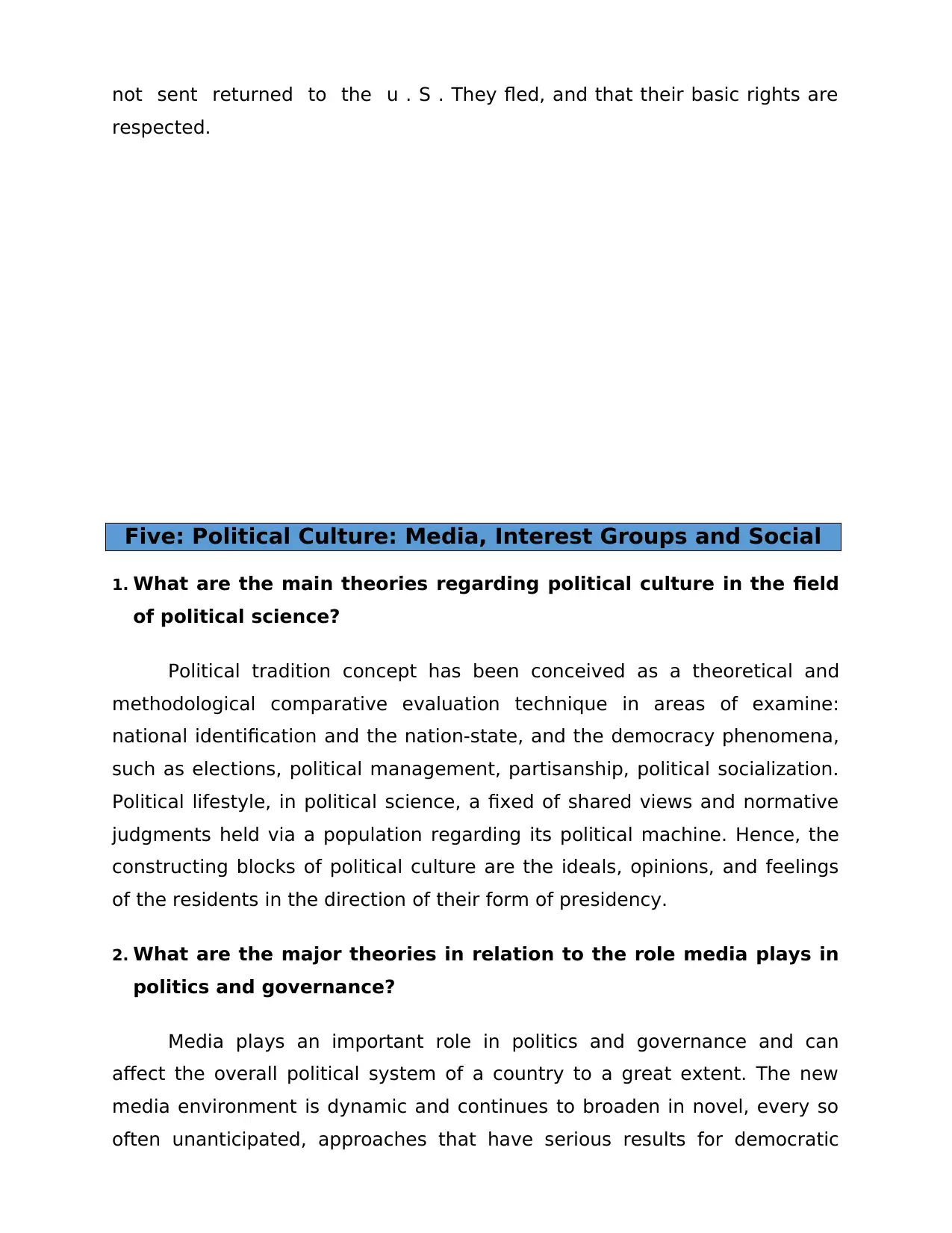
not sent returned to the u . S . They fled, and that their basic rights are
respected.
Five: Political Culture: Media, Interest Groups and Social
1. What are the main theories regarding political culture in the field
of political science?
Political tradition concept has been conceived as a theoretical and
methodological comparative evaluation technique in areas of examine:
national identification and the nation-state, and the democracy phenomena,
such as elections, political management, partisanship, political socialization.
Political lifestyle, in political science, a fixed of shared views and normative
judgments held via a population regarding its political machine. Hence, the
constructing blocks of political culture are the ideals, opinions, and feelings
of the residents in the direction of their form of presidency.
2. What are the major theories in relation to the role media plays in
politics and governance?
Media plays an important role in politics and governance and can
affect the overall political system of a country to a great extent. The new
media environment is dynamic and continues to broaden in novel, every so
often unanticipated, approaches that have serious results for democratic
respected.
Five: Political Culture: Media, Interest Groups and Social
1. What are the main theories regarding political culture in the field
of political science?
Political tradition concept has been conceived as a theoretical and
methodological comparative evaluation technique in areas of examine:
national identification and the nation-state, and the democracy phenomena,
such as elections, political management, partisanship, political socialization.
Political lifestyle, in political science, a fixed of shared views and normative
judgments held via a population regarding its political machine. Hence, the
constructing blocks of political culture are the ideals, opinions, and feelings
of the residents in the direction of their form of presidency.
2. What are the major theories in relation to the role media plays in
politics and governance?
Media plays an important role in politics and governance and can
affect the overall political system of a country to a great extent. The new
media environment is dynamic and continues to broaden in novel, every so
often unanticipated, approaches that have serious results for democratic
⊘ This is a preview!⊘
Do you want full access?
Subscribe today to unlock all pages.

Trusted by 1+ million students worldwide
1 out of 16
Related Documents
Your All-in-One AI-Powered Toolkit for Academic Success.
+13062052269
info@desklib.com
Available 24*7 on WhatsApp / Email
![[object Object]](/_next/static/media/star-bottom.7253800d.svg)
Unlock your academic potential
Copyright © 2020–2026 A2Z Services. All Rights Reserved. Developed and managed by ZUCOL.





